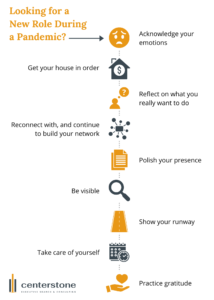Looking for a New Role During a Pandemic?
Contribution | Written by Stephen Wood
What a difference a few months make. We’ve gone from record low, to record high US unemployment in the blink of an eye. If, over the past few months, you have unexpectedly seen your job disappear, or have been furloughed and caught-up in a vortex of uncertainty, don’t panic. As an executive outplacement coach, following are recommendations that have led my clients to quicker recovery—landing a new opportunity and being well on their way to a new equilibrium:
- Acknowledge your emotions. Shock, disbelief, anger, resentment, embarrassment, sadness, anxiety. These are all normal and to-be-expected feelings following an unexpected job loss. You are not crazy for experiencing them and you are not alone. Rather than trying to bury these emotions, simply acknowledge them and give them space and time to dissipate. But don’t allow them to get in your way of staying focused and purposeful in your search.
- Get your house in order. Make sure you connect with your former company’s benefits department to understand your options under COBRA to maintain your medical insurance. You may find that securing coverage directly through an independent broker or directly from a carrier may be less expensive than the COBRA rates you would pay. If you have a financial planner, arrange a call or meeting to assess your situation and discuss whether you need to, or should tap into any accounts or funds to tide you over. Also, you are likely to be eligible for state unemployment benefits. Because most states do not start benefits for at least a week after your last day of work, don’t delay filing. (Also, with state unemployment offices being inundated, you may face some delays in the processing of your claim- so don’t wait!) Finally, at least for now, many credit card issuers, landlords and mortgage lenders are being flexible with payment terms. So, if you need to preserve cash, consider contacting them to request forbearance.
- Take time to reflect on what you really want to do next. Too frequently people who are laid off jump immediately into job search mode without taking a “pause” to reflect on what they really want in their next roles. Do you want to do exactly what you just did, or is this the time to explore other avenues, whether it be a different role or a different industry? One need not pursue a single path; rather, you can take multiple tracks on your job search journey.
- Reconnect with, and continue to build your network. We know that the vast majority of jobs are the result of actively networking. Yes, it’s hard work. And informing friends and former colleagues you have lost your job and are looking for a new one can even make you feel self-conscious. There is nothing to be ashamed about during these times—millions of others are in the same boat through no fault of their own making. When you reach out to your network, you’re not asking them for a job. Rather, you should simply be seeking their advice and counsel about your job search strategy: “Am I targeting the right organizations?” “Are there companies you are aware of that may be in need of my particular skills and experiences?” “Are there people in your own network you would recommend I reach out to?” Of my recent outplacement clients who have landed new roles, almost all have done so via their networking.
- Polish your presence. Is your resume current and professional? Does it crisply describe your accomplishments and results? Understanding that recruiters very quickly scan resumes and on-line profiles, make sure your “list” of responsibilities and achievements are in descending order of importance. If a recruiter only read the first two bullets under a recent job, would she see the most relevant and important points you’d want her to see? Does it contain the keywords and phrases that will catch the attention of a recruiter or a company’s automated applicant tracking system? I also caution against sharing a resume that is too busy or focuses all the reader’s attention on skills and achievements versus on your actual employment history. Recruiters want to see where you’ve been and what you’ve done. If they cannot discern this from your resume easily and quickly, they’re likely to move on to the next resume in their stack. Also, given the ease with which you can edit your resume, if you are sharing your resume in response to a particular job opening, tailor it to address that specific role. If the job description states the role requires certain experiences or skills, make sure your resume includes and highlights whatever you have, or have done, that match those requirements. Finally, read and reread your resume and have others proofread it as well. Is it free of spelling, grammatical and punctuation errors? Recruiters and hiring managers can be turned-off by typos, believing that such inattention to detail may signal similar inattention to one’s work product in the office.
- Be visible. LinkedIn has become the search engine of choice for most recruiters. The company reports having over 130 million US users. Make sure your profile showcases you in the best possible light. Carefully choose your profile picture. It should accurately represent you at your current best—no 20-year-old or photoshopped photos. Have a clean and simple background. And by all means, don’t include pets, children, or images of you on the beach, in a wedding party, golfing or skydiving. Yes, I see these kinds of images every day on LinkedIn and they don’t present the professional image you need to convey when competing against so many others. Another LinkedIn tip: make sure you have activated the Open to New Opportunities feature to signal to recruiters your receptivity to explore roles they may have open. Finally, avoid a too abbreviated profile—I see many that simply list recent employers and job titles. I counsel my clients that their profile should generally mirror their resume to include highlighting significant responsibilities and accomplishments. You want a recruiter to become significantly intrigued by your background that they pick up the phone or email you. If you only include your name, rank and serial number, you provide too little information to catch a recruiter’s attention and they will quickly move on to the next profile.
- Show your runway. Sadly, ageism is alive and well in America, despite federal and state prohibitions against age discrimination. I advise my older (I prefer “seasoned” instead) clients not to include graduation years if more than 25 years ago, and to forgo listing very early roles on both their resumes and LinkedIn profiles. You want to avoid being eliminated from consideration before ever having the chance to speak with the recruiter or hiring authority.
- Take care of yourself. You probably had a pretty specific routine before losing your job. You now need a new routine that, in addition to carving out time each day for your networking and job search, includes time for healthy activities—walking, swimming, gardening or reading, as well as time with family, friends and community organizations you’ve been involved with. Maintaining your physical and mental health is now more important than ever because this phase of your life may last a while and you need to be on top of your game.
- Practice gratitude. Throughout the day, but especially at night after a long day, purposely think about the blessings you have—family, health, faith, friends: the people and things that matter the most and without which we’d be incomplete. It’s easy to become dispirited while in a job search, but I find that refocusing one’s attention to all the good in our lives brings calm and peace. And when that new job arrives—and it will—remember to go back and thank all those people who helped you along the way. Likewise, later, pay it forward to those who find themselves where you were. As you were grateful for all the help you received, share your insights and learnings with others!
Taking your time, getting a plan and driving that with discipline will help you stabilize and know when an opportunity is the right one for you. Taking care of yourself and recognizing the value of change and having gratitude will strengthen your resiliency. That is a coveted executive skill and is finetuned during challenge. Soon, I assure you – your job search will be a distant memory and you’ll be remarkably gratified when you pay it forward when you are tapped to share your network and expertise…from your new position.
Stephen Wood is EVP, Managing Director of Centerstone Executive Search & Consulting in Charleston, South Carolina. Before joining Centerstone, Stephen spent more than 20 years in chief human resources roles for Fortune 500 firms in hospitality, healthcare and telecom, directing the recruitment of C-Suite officers in multiple disciplines. Stephen received his undergraduate degree from the College of William & Mary and his Juris Doctorate from the University of Virginia. Contact Stephen at [email protected] or 843-284-8892.




